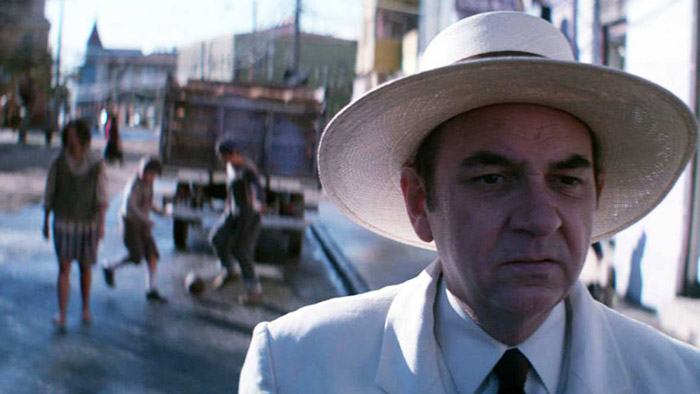Pablo Larraín’s Neruda is an impeccably crafted film, blurring fact and fiction to create something more engaging. The film is much more than a standard biopic of Chilean poet Pablo Neruda (Luis Gnecco). After the Second World War, Neruda—already an icon for his politically charged poetry advancing workers rights throughout Latin America—faced more pressure and fear of persecution than ever as Communism was vilified around the world. Guillermo Calderón’s script tells two personal stories through the lense of a greater political narrative—the struggle between communist rebels and a Chile’s militant regime following in the 1940s. After a new President, with strong ties to the United States government, takes power in Chile, the communist party is quickly banned, forcing Neruda—a communist senator—to hide or flee. This starts a cat-and-mouse chase between the two main characters: Neruda and Óscar Peluchonneau (Gael García Bernal of The Motorcycle Diaries), a fictional police officer who is tasked with bringing Neruda to justice.
Neruda’s characters are where the film shines. Luis Gnecco’s depiction of Pablo Neruda as a revolutionary figure captivates not only the masses of workers in the film, but the audience as well. Neruda is depicted as a sensualist who enjoys the finer things in life, but striking moments in the film reveal his deeply-held communist values. Gnecco depicts this brilliantly when, after encountering a young beggar, Neruda leaves the girl draped in his fancy white suit. Though many sizes too big for her, the suit must be worth a relative fortune. This could have been an overly cheesy scene in the hands of most actors, but Gnecco makes it feel real, nailing the charm one would expect from the populist artist.
Gnecco’s performance is not the only one that stands out: Gael García Bernal’s portrayal of Óscar Peluchonneau is a chilling interpretation of the classic film noir police detective. He also serves as the film’s narrator, though not a completely trustworthy one, leaving the audience to decide what to believe as Peluchonneau provides information about his and Neruda’s pasts. The unreliable narrator is rarely used in modern cinema, but Neruda pulls it off. Mercedes Morán’s portrayal of Delia del Carril, a Chilean-Argentinian painter and Neruda’s second wife, is also worth mentioning. Though not as exceptional a performance as García Bernal, Morán offers a warm presence that grounds the more grandiose Neruda.
Though the main characters rarely interact face-to-face, they are connected through their love of fiction. Most of their interaction is carried out through Neruda’s notes, scribbled in copies of detective novels and cleverly planted where Peluchonneau will find them. Both men can only imagine their story ending like a detective novel. Both expect a great chase that ends either in near-escape or the action-packed capture of Neruda. This dynamic builds an unusual connection between the two main characters, as their friends and accomplices struggle to understand their desire to live out the stories that are loved by both men.
Set against a backdrop of Chile’s incredible natural features, as well as the beauty of Chilean art and culture, Neruda’s narrative is unique and captivating. The film is both a fascinating semi-biographical piece on a brilliant artist and social icon, and a work of fiction with one of the best antagonists in recent film history. Brought together by a tight script and outstanding performances by the whole cast, Neruda is one of 2016’s hidden gems.









